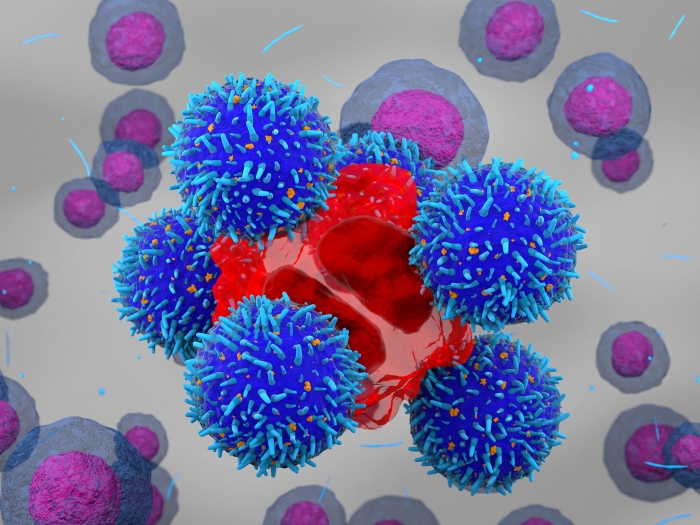Partners report pain, fatigue, sleep issues tied to missed work, medical bills
5:00 AM
Author |

A cancer diagnosis can cause financial strain on patients as they cope with the cost of treatment and lost work. But what about their partners?
A study from University of Michigan Rogel Cancer Center researchers surveyed the partners of colorectal cancer patients and found the financial impact of a loved one’s diagnosis also impacts the partner’s health-related quality of life.
“We know that financial toxicity or hardship is a significant effect of cancer and its treatment and is associated with poor health issues for patients and survivors. Financial toxicity extends to caregivers or partners too. We wanted to understand how that financial toxicity affects the caregiver’s health outcomes, such as anxiety and depressive symptoms, fatigue, overall quality of life or well-being,” said lead study author Lauren V. Ghazal, Ph.D., FNP-BC, a postdoctoral fellow in cancer care delivery research at the Rogel Cancer Center and the University of Michigan School of Nursing. “It is important to examine the full effect of financial toxicity on a household in order to develop multilevel interventions that center the patient,” she said.
Researchers surveyed patients who had been treated between one and five years earlier for stage 3 colorectal cancer. They also surveyed patients’ spouses, domestic partners or significant others who lived in the same household. 307 patient-partner pairs responded. Surveys asked about:
- Financial burden, such as cutting down on spending or missing bill payments
- Debt, including unpaid bills, bank loans or borrowing money from family or friends
- Financial worry, focused on current or future financial problems from the cancer treatment
Patients and partners were both asked about health-related qualify of life factors, including physical function, anxiety, depression, fatigue, sleep disturbance, social roles and activities, and pain. Results are published in JAMA Network Open.
Of partners who worked full- or part-time when the patient was diagnosed, 39% missed between one week and one month of work and 38% said they lost income due to the person’s cancer.
SEE ALSO: Crowdfunding helps pay the bills during cancer, but at a price
Almost two-thirds of partners reported financial burden, including cutting down on expenses, activities, food or clothes, or using savings. About a third of partners had high financial worry, which increased the more they lost income or missed work. And 29% of partners reported debt related to the cancer diagnosis and treatment.
Across the seven health-related quality of life issues, financial toxicity was consistently associated with worse quality of life factors. Partners described financial toxicity as primarily related to health insurance and employment status. But they also reported extra emotional spending, disrupted social lives, having to ask family and friends for help with medical expenses, and worry over what could have been if they hadn’t had insurance.
Younger partners were significantly more likely to report financial burden and debt, which is striking as rates of colorectal cancer among younger adults has increased in recent years.
“When you think of key developmental milestones young adults expect to achieve, they are driven by money: completing education, establishing employment, cultivating romantic relationships, starting a family. All of these milestones impact becoming financially independent, and all are susceptible to disruption. And of course, a cancer diagnosis is a major disruption,” said senior study author Christine M. Veenstra, M.D., MSHP, associate professor of medical oncology at Michigan Medicine. “As we see colorectal cancer becoming more common at younger ages, it is imperative we assess for financial hardship among patients and their partners and connect them with services and support both within and outside the hospital setting,” Veenstra said.
Future research will analyze the impact of financial toxicity on patients and partners together. The team hopes to identify employer-level considerations or other interventions that could help to mitigate financial toxicity among patients and their partners.
Additional authors: Paul Abrahamse, M.A.; Kevin C. Ward, Ph.D.; Arden M. Morris, M.D., M.P.H.; Sarah T. Hawley, Ph.D.
Funding for this work is from the National Cancer Institute (K07CA196752, P30CA046592, HHSN2612018000031, HHSN26100001, T32CA236621) and the Centers for Disease Control and Prevention (5NU58DP006352-03-00). This work was supported by these Rogel Cancer Center Shared Resources: Cancer Data Science
Paper cited: “Financial Toxicity and Its Association with Health-Related Quality of Life Among Partners of Colorectal Cancer Survivors,” JAMA Network Open. DOI: 10.1001/jamanetworkopen.2023.5897

Explore a variety of health care news & stories by visiting the Health Lab home page for more articles.

Department of Communication at Michigan Medicine
Want top health & research news weekly? Sign up for Health Lab’s newsletters today!





